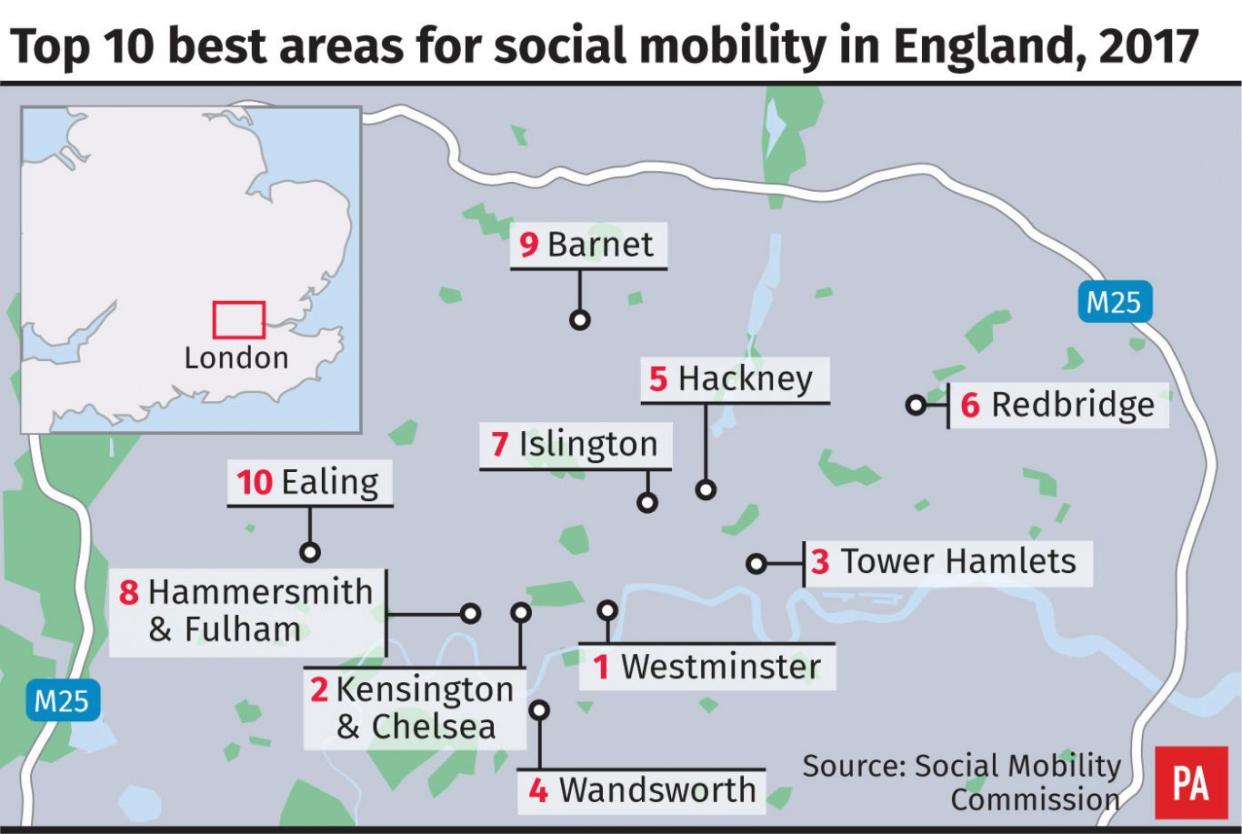Report warns of 'stark social mobility lottery in Britain'

Britain is in a "spiral of division", with London providing greater opportunities for the disadvantaged than coastal, rural and former industrial areas which are "left behind economically and hollowed out socially", a report has found.
The capital and its commuter belt resemble "a different country" in a "postcode lottery" in which life chances are increasingly tied to where people live, the Social Mobility Commission found.
Young people in "left-behind" communities face lower rates of pay, fewer top jobs and commuting times nearly four times longer than those in cities.

Westminster was the best performing area for social mobility in a ranking of all 324 local authorities in England, while the worst was West Somerset.
A map of the nation's social mobility "hotspots" was dominated by London, while the East and West Midlands were the worst performing regions overall.
Commission chairman Alan Milburn said: "The country seems to be in the grip of a self-reinforcing spiral of ever-growing division. That takes a spatial form, not just a social one. There is a stark social mobility lottery in Britain today.
"London and its hinterland are increasingly looking like a different country from the rest of Britain. It is moving ahead, as are many of our country's great cities. But too many rural and coastal areas and the towns of Britain's old industrial heartlands are being left behind economically and hollowed out socially."
The independent commission, which was set up by the Government, highlighted estimates which suggest the North is £6 billion underfunded every year compared with London, and called on ministers to boost spending in areas which need it most.
But this may not be as simple as directing money to the poorest areas, as some of the most deprived are social mobility hotspots, including most London boroughs.
Meanwhile affluent areas such as West Berkshire, Cotswold and Crawley are among the worst for good education, employment and affordable housing opportunities for the disadvantaged.

The study found divisions across education, work and housing.
More than half of London schoolchildren on free school meals achieve A*-C in English and maths GCSE, compared with an average of 36% in other English regions.
A "critical factor" in the performance of top local authorities was the number and quality of teachers available, while isolated rural and coastal schools suffered, the report said.
In 71 largely rural areas more than 30% of people earned below the voluntary living wage.
West Somerset workers are paid an average of £312 per week, less than half of London's best performing areas - Wandsworth, Richmond and Westminster.
City residents fared worse on housing, illustrated by the 18% of Tower Hamlets residents who owned their own home compared with 80% in Blaby, Rochford and Harborough.
To tackle the divides, the commission called on the Government to rebalance transport spending, provide a fund to back school partnerships in rural and coastal areas, and spend £72 million to ensure collaboration between local education systems and employers.
Local authorities should become accredited Living Wage employers and encourage others to do likewise, as well as subsidise public transport for children in disadvantaged areas, it said..
And regional schools commissioners should be held responsible for ensuring there is a good supply of teachers in their area, it added.
Mr Milburn said: "Tinkering around the edges will not do the trick. The analysis in this report substantiates the sense of political alienation and social resentment that so many parts of Britain feel.
"A new level of effort is needed to tackle the phenomenon of left-behind Britain. Overcoming the divisions that exist in Britain requires far more ambition and far bigger scale. A less divided Britain will require a more redistributive approach to spreading education, employment and housing prospects across our country."


